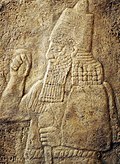Wikipedia talk:Featured article candidates/Sennacherib/archive1
Sennacherib was the king of the Neo-Assyrian Empire from 705 BC to his death in 681 BC. Sennacherib is one of the most famous Assyrian kings for his role in the Old Testament of the Bible, which describes his campaign in the Levant. The Levantine War of 701 BC broke out after several Assyrian vassals in the region rebelled, including the Kingdom of Judah under King Hezekiah. The Assyrians invaded Judea, and Hezekiah submitted. Sennacherib faced considerable difficulty in controlling Babylonia and destroyed the city of Babylon in 689 BC. He transferred the capital of Assyria to Nineveh, launching one of the most ambitious building projects in ancient history. He expanded the city, constructed great city walls, numerous temples and a royal garden. Sennacherib was murdered by his eldest son, who had been disinherited and hoped to seize power for himself. A younger son, Esarhaddon, raised an army, seized Nineveh, and installed himself as king as intended by Sennacherib. (Full article...)
999 characters, including spaces
Hi Ichthyovenator and congratulations. A draft blurb for this article is above. Thoughts, comments and edits from you or from anyone else interested are welcome. Gog the Mild (talk) 12:32, 30 January 2021 (UTC)
- @Gog the Mild: Thank you again! I changed "Judaea" to "Judea" above since that spelling appears to be more common. I think the murder and succession comes off a bit confusing in the blurb (that Esarhaddon became king as intended by Sennacherib) - perhaps this should be trimmed or it should be made clear, without going into excessive detail, that the eldest son and murderer was the original heir and probably killed Sennacherib because Esarhaddon had been made heir instead. What do you think? Ichthyovenator (talk) 12:37, 30 January 2021 (UTC)
- @Gog the Mild: Looks good now! Ichthyovenator (talk) 12:43, 30 January 2021 (UTC)

